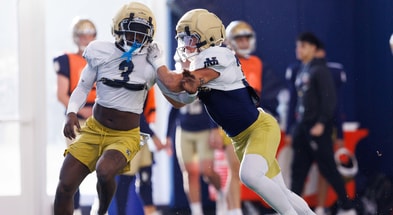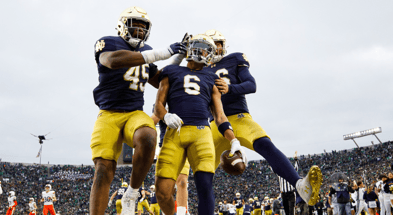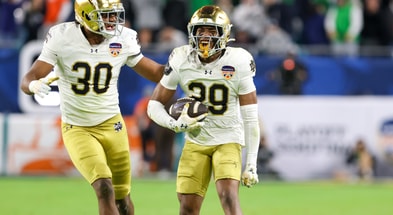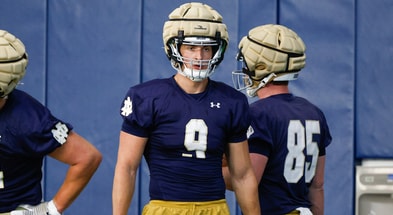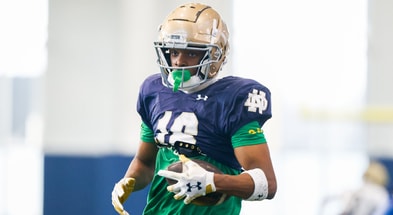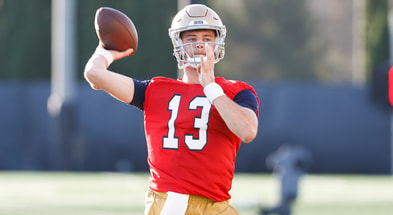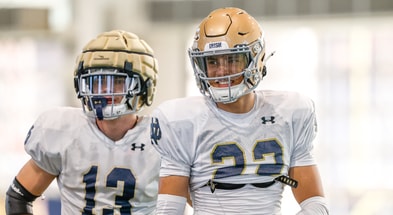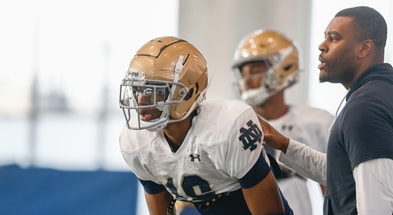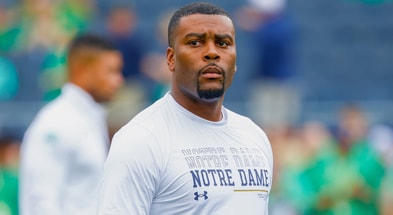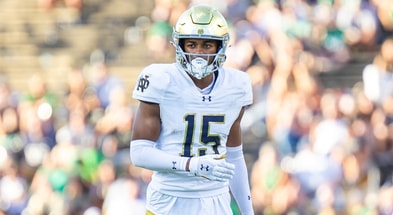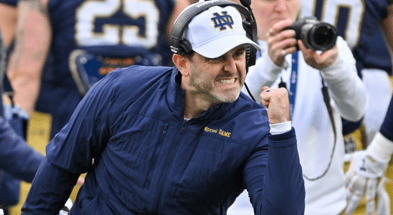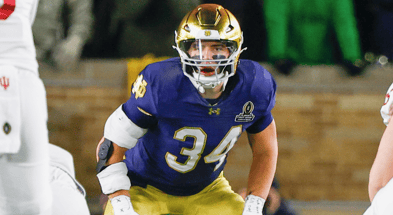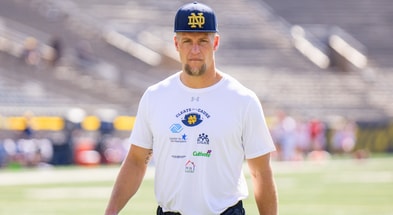How will Marcus Freeman attempt to raise Notre Dame’s ceiling? By doing what got him here so quickly
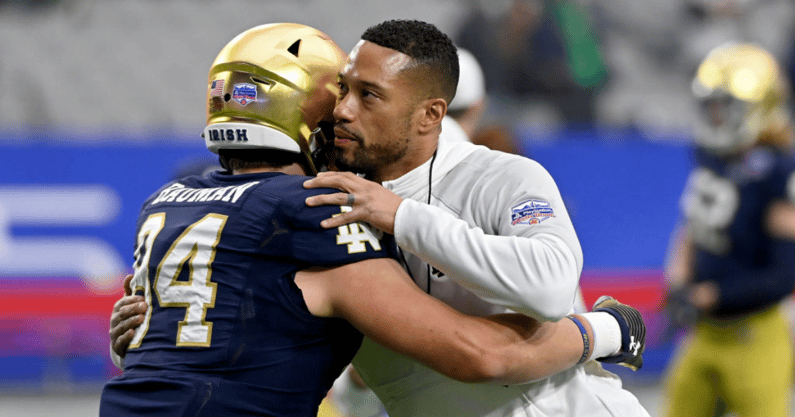
Editor’s note: This story ran in the 2022 Notre Dame Football Preview edition of Blue & Gold Illustrated. Digital editions are available for purchase here.
Marcus Freeman needed 12 seasons to climb from the bottom rung of the coaching ladder to one of college’s football’s most coveted corner offices.
It’s a height Freeman set his sights on the moment he became a graduate assistant at Ohio State in 2010. He kept his vision focused on it as he navigated four wayward seasons as a Purdue assistant. As he pondered his next move after the Boilermakers’ staff-wide dismissal in 2016. As he blossomed into one of the nation’s most coveted defensive coordinators at Cincinnati. As he came to the cusp of his first head coaching job.
Freeman becoming Notre Dame’s head coach fits the plan, even if it came at a much earlier age (35, now 36) than anyone expected. He’s the youngest person to be hired into the job since 25-year-old Terry Brennan in 1954.
Sure, it required a little good fortune and opportune timing. Freeman was already in the building as defensive coordinator when Brian Kelly burned rubber down Leahy Drive early in the morning of Nov. 30, headed south. A successful 11 months served as a de facto job interview.
“He was at the right place at the right time doing the right thing,” said former Kent State and Purdue head coach Darrell Hazell, who hired Freeman to be his linebackers coach at both places. “That’s a credit to him.”
Notre Dame entrusting Freeman with this job at this point in his career is, above all, a mighty display of belief. Freeman is not here to tear down the program to its studs, but to enhance it.
How? By being exactly who he was the last 12 years, as a linebacker at Ohio State from 2004-08 and in his youth growing up in greater Dayton. People from every stage of his life are willing to push their chips to the center of the table to bet on his success. To them, it was a matter of when and where — not if — he coaxed an athletics director into taking the plunge.
“It all makes sense,” said Garrett Hudson, a former Purdue linebacker who played for Freeman.
That begs for a follow-up. Who is Marcus Freeman as a coach, and how did he put himself in position to earn an opportunity most in his profession crave?
‘He still thinks he’s a novice’
There is no manual for running a college football program. It’s not a piece of IKEA furniture that comes with a step-by-step guide. Nor is there one method for success. Anyone who goes into it thinking he has all the answers or a routine he will cling to is asking to get roundhouse kicked by reality.
For those in Freeman’s spot as a first-timer, especially in a fishbowl job, humility is a requirement. An admission you know what you don’t know — backed with an insatiable desire to learn it. Freeman’s appetite is indeed voracious. It’s his wiring, not his reaction to a new job.
“He still thinks he’s a novice at everything,” Hudson said. “Even though he is the head coach, he will sit and listen and learn like he’s a freshman on the football team.”
Hudson remembers Freeman wielding a notebook in nearly every meeting at Purdue, looking for any tidbit to ingest or a new perspective to consider. Maybe he’d learn something interesting. Maybe he’d decide it wasn’t for him. Either way, he valued the chance.
“He’s a continual sponge,” Hazell said.
At Notre Dame, Freeman sought out every living former Irish head coach and talked with each at least once. When he learned Jerome Bettis was back on campus this spring finishing his degree, he asked Bettis to come by his office. The two talked weekly throughout the semester. He implemented weekly meetings with the Irish quarterbacks.
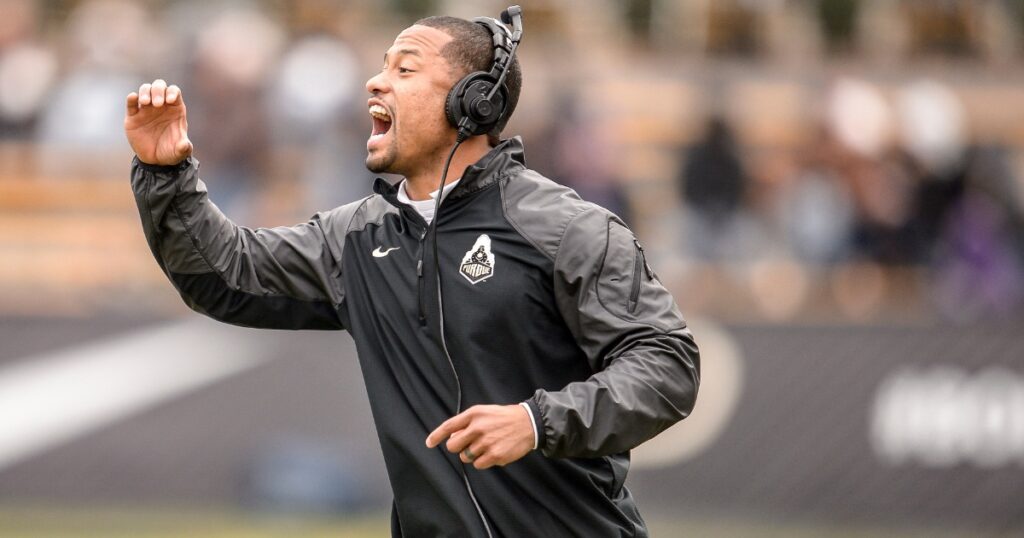
Those are just a few examples. He speaks of the April 23 “legacy weekend” where nearly 300 former Notre Dame players came back for the spring game as an educational experience for him. A major factor in hiring Al Golden as defensive coordinator was Golden’s 10 years of head coaching experience.
Freeman wants his proactive attitude to trickle down through the program. The day he was introduced, he declared “challenge everything” a core program principle. Its simplest distillation is, “find a better way.” Not necessarily in response to failure, but to fuel an ever-burning quest to ascend. If Notre Dame takes the final steps needed to reach the sport’s summit, that attitude will be at the forefront.
The summit is the goal, full stop. In every facet.
“If he’s not getting the No. 1 recruiting class out there, and it sounds like they kind of are right now, he’s going to find out why they’re not,” said Jay Minton, Freeman’s coach at Huber Heights (Ohio) Wayne High School. “He’s not going to throw excuses. It won’t be that it’s hard to get into Notre Dame or whatever.
“It’ll be, ‘Why can’t we? Why aren’t we? We will do it.’”
The day Freeman stops thinking that way is the day he stops becoming himself.
“With Marcus, it was always obvious to me he loved football,” said former Ohio State wide receiver Anthony Gonzalez, Freeman’s teammate from 2004-06 and now a U.S. Congressman. “If you love something, if you’re willing to dedicate your professional life to it and you constantly push yourself to get better, my experience is more often than not, it leads to incredible success.”
Genuine connection
The term “player’s coach” has reached the stage of tired cliché. For as frequently as it’s tossed around, there’s not a clear definition. It’s often a hollow label cast on affable coaches.
Freeman, though, calls it a badge of honor.
But only because he has a firm idea of what it means. Or more importantly, what it doesn’t.
“Where his magic will be is he won’t be the guy where it’s obvious he cares about them, but the kids can do whatever they want,” former Ohio State head coach Jim Tressel said. “He’s going to be caring but demanding.
“Sometimes when you hear the phrase ‘players coach,’ it’s taken as the players like everything he does or they just like playing for him. Part of that may be true, but what players really like is someone who will help them become the best they can be. Sometimes those are stern moments.”
As Hudson can attest.
“I’m going to go to my grave saying he was the person to push me the hardest, but also got the most I’ve ever been able to get out of myself,” Hudson said.
A couple weeks before Purdue began fall camp in 2016, Freeman told the linebackers to meet him in the locker room around 9 p.m. and dress for a workout. They did — and saw a Navy SEAL stroll in.
“We’re going, ‘Lord, what the hell is about to happen?’” Hudson said.
The linebackers jogged around campus, stopping to do pull-ups, dead-hangs and swim laps until they couldn’t anymore. They were split into teams, and each team had a tree log to carry for the night. The goal was to teach them how to stave off mental fatigue and create a feeling they could carry over to games. Freeman was at their hip all night, offering constant encouragement.
Top 10
- 1Breaking
Final AP Poll
Basketball Top 25 released
- 2Hot
Way-Too-Early Top 25
Looking ahead to 2025-26 hoops
- 3
Nick Saban
Nominated for Emmy
- 4Trending
Hailey Van Lith
Stuns as SI Swimsuit cover model
- 5
Jay Williams
Calls out refs in title game
Get the On3 Top 10 to your inbox every morning
By clicking "Subscribe to Newsletter", I agree to On3's Privacy Notice, Terms, and use of my personal information described therein.
“The hardest but most rewarding evening of my four years there,” Hudson recalled. “As hard as he could be on us, he was also loving, caring, always had our best interest at heart.”
Freeman found an exemplar in his own playing career. Luke Fickell, then his position coach at Ohio State and now the Cincinnati head coach, wasn’t afraid to give him tough love or grill him in a film session. Freeman was receptive because he wanted to be coached hard, but also because their off-field interactions left no doubt Fickell cared about him. It’s why Fickell remains a mentor.
RELATED: More Notre Dame football:
• Notre Dame football 2022 All-Opponent Team: Defense
Freeman not only made a point to leave his office door open, but let players see him in a different setting. At all his prior stops, he hosted barbeques at his house with his family present. He met players at their dorms. He asked about their lives. He displayed empathy.
“It made me want to jump in front of a car for the guy,” Hudson said. “To let us come over to his home with his kids and his wife and other coaches, how can I not play hard for this guy who’s opening up his house for me?”
The gesture spoke for itself. Freeman’s persona made even more of a difference.
“I think instantly, he saw his relatability with the players and connection with the players was special,” said former Kent State and Purdue running backs coach Jafar Williams. “How he communicated was the biggest thing.”
So was the substance.
Finding his voice
Freeman is comfortable in his own skin as a coach, but he had to grow into it. He had an enviable list of mentors, starting with Tressel, Fickell and Hazell, each of whom he has known since his freshman year at Ohio State. An avid learner’s heaven. Freeman watched, listened and soaked in everything he could at every stop.
The trick, though, is finding the harmony between parroting leaders and using their methods to add to your authentic voice. He had to find his voice or risk becoming a mishmash of clichés that players discard the moment they’re uttered.
“Football players have a pretty solid BS meter,” Gonzalez said. “Knowing Marcus for who he is, I think his love for the game and his passion for it will always come through in a genuine way.”
Now, Freeman has to find himself as a head coach while he navigates all the new tasks and challenges that come with the big whistle. His mentors are not lifelines, but sounding boards.
“Some people will call you and ask for your input, but haven’t yet done much thinking about the question prior to calling,” Tressel said. “Marcus isn’t going to give you a call until he has given it a lot of thought.
“He’s going to use advice, but he’s not going to just emulate something.”
Freeman understands hurdles will present themselves, though he doesn’t know when and where they will pop up. He leans into adversity being the ultimate learning experience. In a way, his response to it has shaped him more than his success.
In 2017, Freeman’s first year as a defensive coordinator, Cincinnati went 4-8 and finished 83rd in yards per play. True to the “challenge everything” mantra, Freeman did not point fingers or bemoan a lack of talent, but assessed what he could do. Among his answers was a 3-3-5 defense to combat the run-pass options that shredded the Bearcats that season.
Schemes and routines can change, but the adaptability and introspection that inspires tweaks is woven into his fabric.
“He knows who he is as a person,” Tressel said. “He knows what’s important. He has a perspective that’s very healthy. It will be harder to shake him up into panicking or trying to find out what everyone else did wrong. His strength of character is so well developed.”
It’s what guided him to becoming Notre Dame’s head coach, even if he didn’t specifically aspire to get the job until it opened. He came to Notre Dame in January 2021 to be himself and see where it takes him.
Pretty far, turns out. No reason to stop now.
“If he changes,” Minton said, “I’ll go up there and kick his butt.”

